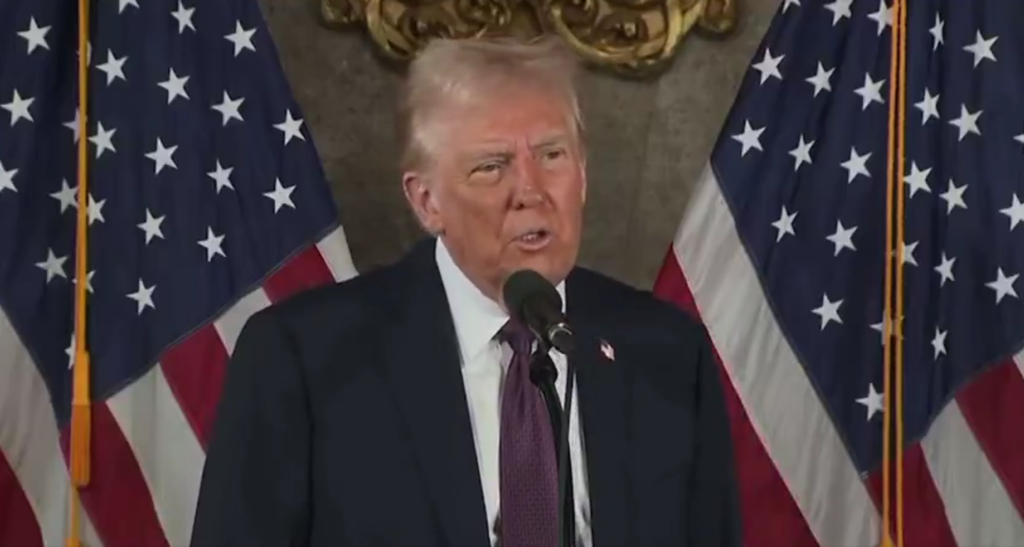US President-elect Donald Trump described Turkish President Recep Tayyip Erdoğan as “a “friend” on Tuesday and claimed that Erdoğan had respected his request to refrain from attacking Kurdish groups in Syria.
Trump made the remarks during a press conference at his Mar-a-Lago residence in Florida when asked about the future of US troops in Syria, a point of contention as he prepares to take office later this month.
President elect Trump: “Turkey has been after #Syria under different names and in different ways, forms for 2000 years. Those people that went in are from #Turkey . President Erdogan is my friend. Someone I love and respect. I think he respects me too. Also, when I asked him not… pic.twitter.com/LPCSlNxg1J
— Mutlu Civiroglu (@mutludc) January 7, 2025
The Pentagon recently announced that about 2,000 US troops are stationed in Syria, nearly double the previously reported figure of 900. Trump refrained from giving a definitive answer on troop levels but did address Turkey’s involvement in the region.
Trump described Erdoğan as “a guy I like and respect” and said the Turkish head of state has refrained attacking Kurdish forces in Syria at his personal request.
“He’s the one who didn’t attack certain people after I requested him not to. You know who I’m talking about, the Kurds,” Trump said. “I don’t know how long that’s going, because they’re natural enemies. They hate each other. But he didn’t do that yet, and he didn’t do it in the past also.”
Ankara considers the Kurdish-led Syrian Democratic Forces (SDF) and its main component, the People’s Protection Units (YPG), to be terrorist organizations due to their affiliation with the Kurdistan Workers’ Party (PKK), which has been waging an insurgency in Turkey for decades.
Since 2016, Turkey has launched several military operations in Syria, mainly targeting Kurdish-held areas. These incursions, often conducted on the pretext of securing the Turkish border and establishing “safe zones,” have been widely condemned for displacing civilians and destabilizing the region.
While Trump’s comments suggest that he believes Erdoğan has shown restraint, Turkish-backed forces have seized several Kurdish-majority towns and carried out actions that human rights groups are calling war crimes.
In October 2019, during Trump’s first term, the US faced a backlash for withdrawing its troops from northern Syria — a move that effectively cleared the way for a Turkish offensive against Kurdish allies. At the time Trump defended his decision, saying it was part of his broader goal to reduce America’s military footprint abroad.
Trump’s remarks also made clear that he views Turkey as a strategic partner and prioritizes personal relationships in diplomacy.
“I think he [Erdoğan] respects me also,” Trump said. “If you look at what happened with Syria, Russia was weakened, Iran was weakened. and he [Erdoğan] is a very smart guy.”
Washington’s support for the SDF in the fight against the Islamic State in Iraq and the Levant (ISIL) has been a major source of tension. While the SDF played a crucial role in defeating ISIL, the government in Ankara views the group’s Kurdish leadership as an existential threat.
In a controversial letter to Erdoğan during the 2019 Turkish offensive, Trump urged the Turkish president not to be “a tough guy” or “a fool” The letter was reportedly “thoroughly rejected” by Erdoğan, who threw it away.
As Trump prepares to return to office, his administration’s stance on Syria and its Kurdish allies remains unclear.
Turkish Foreign Minister Hakan Fidan recently expressed optimism that Trump will prioritize American interests by reconsidering Washington’s support for Kurdish forces. Fidan hinted that Trump’s new administration could take a “more decisive and stronger” stance in line with Turkey’s security concerns.
However, critics say that Trump’s policy in the region is often not consistent enough. The sudden announcement of a US withdrawal from Syria in 2018 was criticized by both sides of the political aisle in the US for abandoning the Kurdish allies who had borne the brunt of the fight against ISIL.

